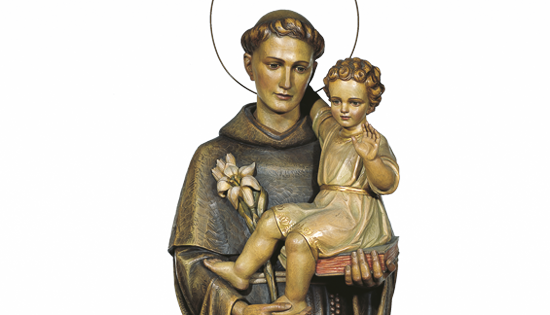It is no easy task to sketch the character of Saint Anthony. There are so many facets to consider.
Preacher and confessor
We can certainly admit that Saint Anthony was, first of all, a tireless preacher and confessor. To get an idea of the intensity of his days it is enough to quote one of his contemporaries, "Anthony would preach, teach and confess all day long, until sunset. Often, he would never eat all day long."
The contemplative life
Let us not forget, however, that the apostolic life of the itinerant preaching of Anthony was alternated with short or long periods of retreat in solitude, as in the best Franciscan tradition.
This alternation has a very simple explanation: Anthony’s active life is an expression of his love for people while the contemplative one showed his love for God. The two kinds of love are closely linked and interdependent, and can be considered as "twin" lives. For Anthony, the state of Christian perfection is not attained in action or in contemplation alone, but in the union of both.
Charity
The central importance of charity in the spirituality of Saint Anthony is therefore comprehensible. Anthony understands charity as the love for God as the supreme good and to love people for the sake of God. Next to this, Anthony lived the fundamental virtues of obedience, poverty and humility, this last virtue he considered as the source and mother of all the other virtues.
Evangelical Doctor
Saint Anthony was a highly learned theologian. His writings, written in the form of sermons - the Sermones Dominicales with an appendix of Sermones Mariani and Sermones de Sanctis (these last never completed) - reflect the doctrinal phase of the first manifestation of Franciscan theology, which will be enriched by other great theologians, like Saint Bonaventure and Blessed John Duns Scotus.
In Saint Anthony’s work, Scripture have a fundamental importance because of the custom of the time that considered Scripture as the principal, if not the exclusive, theological teaching.
Anthony owed a debt to Saint Augustine as a theologian; however he was quite unique and original. He knew how to join the light of intelligence to the affection of the heart; research through speculation to the exercise of virtue; study to prayer, as his seraphic Father intended.

